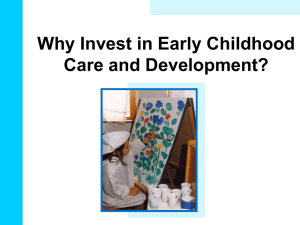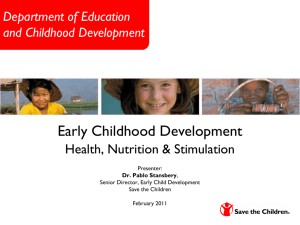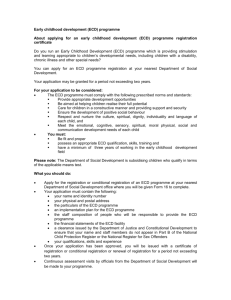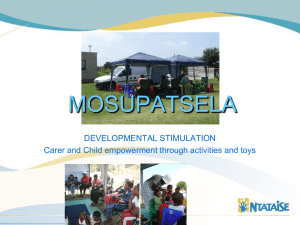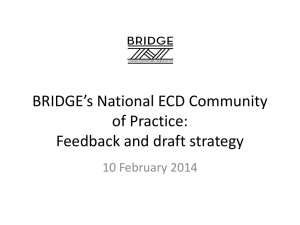Africa ECCD Initiative
advertisement
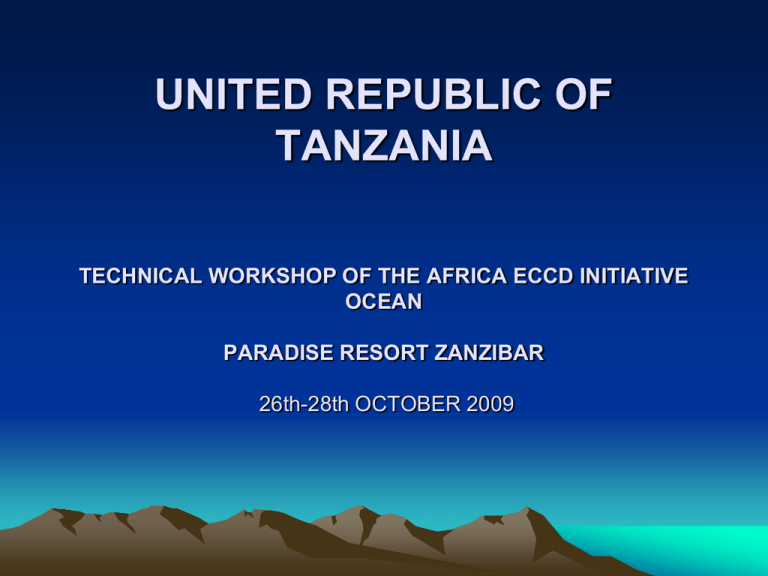
UNITED REPUBLIC OF TANZANIA TECHNICAL WORKSHOP OF THE AFRICA ECCD INITIATIVE OCEAN PARADISE RESORT ZANZIBAR 26th-28th OCTOBER 2009 IMPLEMENTATION OF JOINT INTER-SECTORAL EARLY CHILDHOOD DEVELOPMENT SERVICE DELIVERY INITIATIVE: EXPERIENCES AND LESSONS LEARNED TO DATE IN TANZANIA Introduction • The early years of human life provide a unique opportunity for social investment, but at the same time the most vulnerable period in childhood. • During this time – the child is most at risk of dying in the first year of life, especially within the first month. – Brain development is at its most vital phase from birth to age three and can be impaired if conditions are not present for the child to thrive and reach its full potential. Introduction cont … In Tanzania needs of children especially those age 0 to 8 are inadequately addressed to enable all children to realize their full potential life, in assuring their rights to survival, healthy growth and development. This is shown by some of the facts listed below:• As per 2007 estimates Tanzania has a population of 39,384,223; growth rate is 1.8%; birth rate 37.3/10000; infant mortality rate: 94.5/1000; life espectancy; 48.1; density per sq.m. 111, literacy rate 78% (2003 est.) • One out of three children are under weight, with rural children more likely to be malnourished than urban children. (URT, 2008). Introduction Cont.. • More than 95% of young children lack access to early stimulation and social protection programmes, care facilities or non-fee-paying preschools and parental education (UNICEF, 2007). • There is little or no data on the informal care and education of young children in family and community contexts. • Children’s access to health service remains limited …..8 out of 10 children in Tanzania (who die), die at home and 6 of them without any contact with formal health services’ (URT, 2005, P.11); Introduction cont .. • There is a lack of clear data and about children’s progress and success in the early success with basic literacy and innumeracy skills is vital for ongoing success (Abadzi, 2006); • There are inadequate trained pre-primary teachers- of 16,597 teachers in pre-primary school (2008) 8.6% of them are certified teachers (BEST, 2009). • Overcrowded classes impede teachers in adopting more child-friendly teaching methodologies (PHDR, 2007 Introductions Cont .. • The school enrolment rate is high but so is the drop-out rate – Only 0.3 of enrolment are disabled children – Standard one drop-out is a high 10.6% (BEST 2009,) 22% of children fail to complete primary school. • Data for repetition in early grades is not available leaving issues of student’s needs and programme gaps unaddressed Introduction Cont .. • Realizing that, – over time, ECD issues were only to a limited extent integrated into social sector policies, e.g. community development, health, food & nutrition and education. – And that the systems for supporting ECD, e.g. management, training, human resources, monitoring and evaluation were not in place. – And that ECD services were minimal and the awareness of the specific needs for young children especially those aged 0 to 8 years was low and inadequately addressed to enable them realize their full potential life; • The government of Tanzania had included ECD in the National Strategy for Growth and Reduction of Poverty (NSGRP), better known as the MKUKUTA, and has committed itself to the development of Integrated Early Childhood Development Policy in order to address the needs of young children. – And Primary Education Development Plan has included and budgeted for Pre Primary Education. Development of Inter Sectoral ECD Service Delivery Initiative Given the fact that • the accomplishment of National Integrated ECD Policy framework would take time, • and that needs of infants and young children were ever increasing. Tanzania has decided to Pilot the Joint Inter sectoral ECD Service Delivery Initiative. • and as a result of this decision, the government institutions and departments, civil society organization under the umbrella of Tanzania Early Childhood Development Network (TECDEN), UNICEF and UNESCO and other stakeholders has jointly initiated a process of acting on the matter to ensure that ECD care and services are provided in a holistic and an integrated manner to children of 0-8 years in the country. The impetus for this process arose from a number of challenges facing different service providers particularly. • Duplication of services and subsequent confusion emanating from that duplication. • There has never been systematized and synchronized guidance and coordinated system among different players but rather we have left the operations of the ECD and pre-primary education more in the hands of private operators. • Lack of national Operational Guidelines and Standards for the provision of IECD in the country, responsible ministries and private institutions have been providing the sector-based ECD services according to their own standards or in some cases without well defined standards. Therefore this situation needed rectification. • Lack of monitoring and evaluation of ECD services, has also provided a loophole for rendering sub-standard services, which in some cases have had negative consequences for children. • Global conventions and protocols particularly the Convention on the Rights of the Child (CRC) of 1989; the declaration on the Education For All (EFA) and Millennium Development Goals (MDG). Tanzania is committed to the implementation of the requirements of the international organizations and has declared to pay special attention to the rights and needs of young children. All of these led to the decision of January 2007 workshops that initiated the process of Integrated Holistic Service Delivery Initiative. Goal – to develop and implement low cost models of integrated family and community based early childhood care and education which address the needs of specific age groups within the early childhood period and which can be sustainable and taken to national scale. Specific objectives • To facilitate District/Community Assessments of: • Existing indigenous KNOWLEDGE, ATTITUDES AND PRACTICES/childcare systems related to young children; • Existing NEEDS in relation to support for young children. • Existing organized INTERVENTIONS and community RESOURCES devoted to supporting young children (Govt. NGO/CBO and FBOs). • To conduct Community consultations, review and analyze potential models on integrated ECD models and interventions with greatest potential for sustainable implementation • To support the development of District Plans of Action for initiating and implementing the proposed models/interventions including identification of required inputs, associated costings and potential sources of funding. Specific Objective cont… To support the monitoring, evaluation and documentation of experiences in implementing the agreed models/interventions • To the develop Operational guidelines and minimum standards for the delivery, quality monitoring and regulation of the agreed models/interventions with clearly defined roles of various actors and agencies. • To inform the development of the evolving intersectoral Policy for ECD. Following the recommendations from the series of consultative meetings which began in January 2007 the action plan for implementation of a joint Inter-Sectoral ECD Service delivery initiative was developed and launched on 15th June 2007 together with the launch of the Global Monitoring Report on ECD in Tanzania. The initiative has four major components; Major components of the Initiative • ECD Guidelines and Minimum standards, • Capacity building of ECD national and district community teams • Undertaking baseline research and Institutional mapping so as to identify the actual situation on early childhood and service delivery initiative at the selected district before the delivery of the services, • Piloting of the integrated ECD service delivery initiative in the selected district throughout the country Models in this initiative There are three models which are taken into consideration according to age and the type of services which need to be provided: – Home Based Care Services for children between the ages of 0-2 years, – Community Based ECD centres for children starting from the age of 3-4 years, – Institutional based services/pre-primary/early primary and registered day care centres based services beginning from the age of 5-8 years. Experiences and Lessons Learned Since the advent of this initiative the following activities have been implemented inter-sectorally:• Organized together the EFA/ECD Conference for Ministers Policy Makers, Researchers and Practioners of ECD in February 2008; • Developed an inter-sectoral operational guidelines and minimum standards • Developed the capacity facilitators guide for IECD service delivery sub-committee/facilitation teams from national to community levels; • Conducted a joint baseline survey on mapping on access and quality of existing IECD provision in 8 districts; Experiences and Lessons Learned Cont.. • Developed an age appropriate teaching /learning materials guide; • Consulted intersectorally district councils/wards and communities in pilot areas to: • Seek active participation of the districts /communities in the implementation of intended IECD initiative; • Initiate discussion on how best the IECD would be initiated and implemented; – To register commitments of the district; • Enabled policy and decision makers from key ECD Ministries/institutions to meet, discuss and decide on issues related to ECD; Experiences and lessons learnt cont.. • It is now one of the priorities in Education Sector Development; • It has been mentioned in the parliament as one of the priority areas in the provision ECD services to children in Tanzania. Opportunities • There is a strong political commitment • Integrated ECD Policy is in being developed • There are training institutions for care givers and pre school teachers • Pre school teachers are paid by the government. • Pre school children in public pre schools are provided with capitation grant(10Usd) Challenges • ECD concepts are not given due weight and mostly limited to day care and pre-school activities; • Actual modalities of implementing joint ECD services in integrated manner seem hard to some districts • Need for capacity building and massive sensitization done to the grassroot. • ECD is not yet given due weight in planning and funding at different levels. Conclusion • By providing all what children need, the will develop to their maximum potentially, physically, intellectually, socially and spiritually,. That’s why ECD is now understood as the basis any national development and hence deserves priority in terms of allocation of resources. Thank you for Listening. ASANTE SANA

